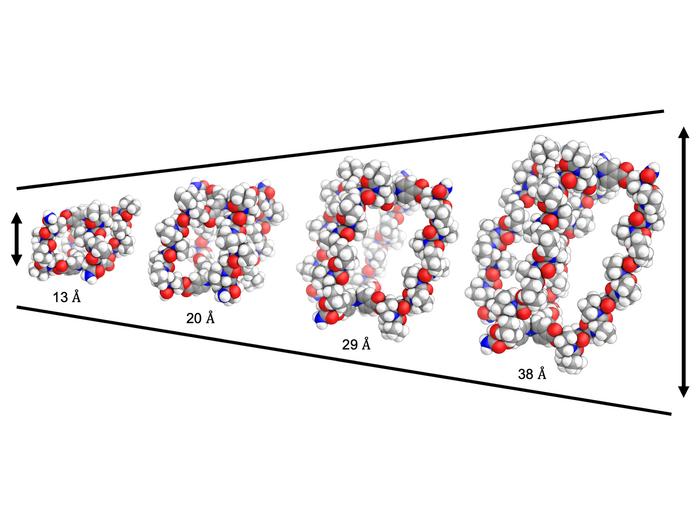A new method of drug delivery using proline, an amino acid found in chicken feathers and skin tissue, could be used to limit the side effects of chemotherapy and repair important enzymes, new research suggests.

Credit: Dr Charlie McTernan, King’s College London and the Francis Crick Institute
A new method of drug delivery using proline, an amino acid found in chicken feathers and skin tissue, could be used to limit the side effects of chemotherapy and repair important enzymes, new research suggests.
Published in the journal Chem today, researchers have designed a cage (a box made of single molecules) from biologically compatible peptides, short amino acids that form the basis of proteins. These cages can house drugs of different sizes and transport them in the body with high levels of precision.
The negative side effects associated with chemotherapy, such as hair loss and nerve damage, are a result of ‘off-site toxicity’, where the treatment kills healthy cells surrounding tumours as well as the tumour itself. By creating a nano-sized cage to house the drug and carry it into the tumour before releasing it, this effect can be channelled more directly to the tumour, shielding healthy cells.
The cage can be tuned to different sizes, enabling different payloads of drugs. This flexible structure allows for chemotherapy drugs, antibiotics, and antivirals to potentially be delivered. Previously, cages of this kind could only be made using hydrocarbon molecules found in tar, which can often be toxic to humans.
This structure, researchers believe, also opens the door for faulty enzymes to be replaced within the body, which has previously not been possible. Historically, enzymes, which are composed of proteins and perform important functions in the body, could only have their activities blocked by drugs. The blocking of this functionality would then have an impact in the body, like reducing inflammation. Now, the cages could replace this function which may lay the groundwork for a new form of treatment.
Principal author Dr Charlie McTernan, Lecturer in Chemistry at King’s College London and Group Leader at the Francis Crick Institute, said “What we’ve created is essentially a biologically compatible molecular teabag. We can fill this teabag, or cage made from widely available proline and collagen, with several different medicines and deliver them in a much more targeted way than we could before.”
“In time, we hope that this could mean that we can limit the hair loss, nausea, and other unpleasant side effects of chemotherapy. We might even be able to repair malfunctioning enzymes that have an influence on the development of cancer. The best part is we can do this sustainably and at scale.”
Proline is very straight and rigid in shape, while also being soluble in water, which makes it uniquely suited for drug delivery, as water makes up roughly 60% of the human body. By binding the peptide to small amounts of metal such as palladium, the researchers could create a tuneable structure they could rapidly increase or decrease in size.
As proline and collagen are widely available and don’t rely on chains of hydrocarbons like previous methods, the team hope to sustainably scale up their current production in the lab.
ENDS
Note to editors
- Paper Citation: ‘Barber et al., ‘Metal-peptidic cages—Helical oligoprolines generate highly anisotropic nanospaces with emergent isomer control’, Chem 10, 1–14. DOI: https://doi.org/10.1016/j.chempr.2024.05.002. Link when embargoe lifts: https://www.cell.com/chem/fulltext/S2451-9294(24)00223-7
- For more information and to talk to Principal Author Dr Charlie McTernan, please contact: kenji.newton@kcl.ac.uk
About King’s College London
King’s College London is one of the top 35 UK universities in the world and one of the top 10 in Europe (QS World University Rankings, 2020/21) and among the oldest in England. King’s has more than 31,000 students (including more than 12,800 postgraduates) from some 150 countries worldwide, and some 8,500 staff.
King’s has an outstanding reputation for world-class teaching and cutting-edge research. In the 2021 Research Excellence Framework (REF), King’s maintained its sixth position for ‘research power’ in the UK. King’s has also been rated third amongst multidisciplinary institutions for impact, with 67.8% of its research impact rated outstanding.
Since our foundation, King’s students and staff have dedicated themselves in the service of society. King’s will continue to focus on world-leading education, research and service, and will have an increasingly proactive role to play in a more interconnected, complex world. Visit our website to find out more about Vision 2029, King’s strategic vision to take the university to the 200th anniversary of its founding.
World-changing ideas. Life-changing impact: https://www.kcl.ac.uk/news/headlines.aspx
Journal
Chem
Article Title
Metal-Peptidic Cages – Helical Oligoprolines Generate Highly Anisotropic Nanospaces with Emergent Isomer Control
Article Publication Date
29-May-2024



